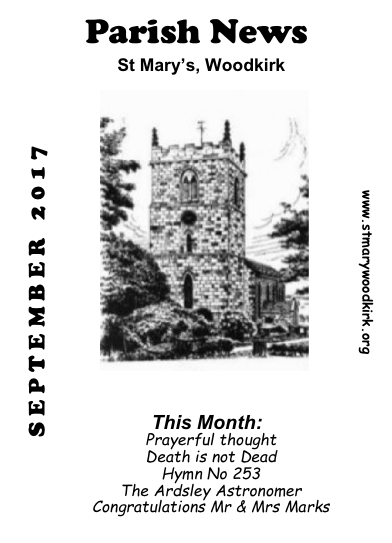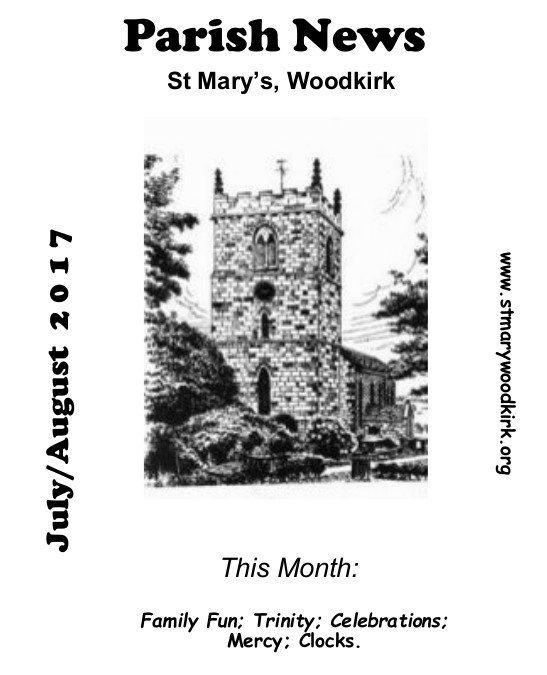by Neal | Oct 1, 2017 | Vicar's Blog |
Summer has passed and we are now moving into Autumn. The tradition of celebrating Harvest Festival in churches as we know it today began in 1843, when the Reverend Robert Hawker invited parishioners to a special thanksgiving service for the harvest at his church at Morwenstow in Cornwall. Victorian hymns such as “We plough the fields and scatter”, “Come ye thankful people, come” and “All things bright and beautiful” helped popularise his idea of harvest festival and spread the annual custom of decorating churches with home-grown produce for the Harvest Festival service.
It is a time we give thanks for the autumn harvest and for all the good things God provides for us, however, in more recent years Harvest Festival has also become about sharing with those less fortunate than ourselves.
It is also to a time when we can reflect on Stewardship and I so I am it is my intention to focus on Stewardship for the first three Sundays of October.
At St Mary’s Church we serve many people in many ways: giving the opportunity for worship to those attending our regular services; sharing the joy of a couple coming to be married or a family bringing their child for baptism; comforting the bereaved. To all these and many more we seek to be a channel of God’s love to those looking to our church for help and encouragement.
Our impact is also felt well beyond the church building itself, sometimes to those who may not normally look to the church for help. Through our outreach into the community, often in partnership with others, we are constantly seeking to meet the needs of the marginalised and vulnerable in our society, aiming to be the salt and light in our communities that Jesus challenges us to be.
All this is possible because of the dedicated commitment of time, skills and energy which people bring to our church and also the financial support given week by week.
Any reflection on giving must start with God. God gives to us abundantly and graciously in creation and redemption, and in sustaining life, day by day. Scripture shows that Godʼs giving is characterised by extravagance, both for nations and for individuals.
Many of Jesusʼ parables and, indeed, his own actions involve celebrations, meals, parties and a sharing of food, financial resources and time, especially with those who might least expect to be included. We might think of the wedding at Cana in Galilee when Jesus turns more water to wine than could possibly be consumed by the wedding guests (John 2.1-11). We might ponder the significance of the provision made for an injured stranger of a different nationality in Jesusʼ story of the Good Samaritan (Luke 10.25-37 ) or the reason why Zacchaeus is inspired by his encounter with Jesus to make fourfold reparation to any he has cheated, bringing this response from Jesus ʻToday, salvation has come to this house!ʼ (Luke 19.8).
It is striking that the writers of the Gospels record Jesus reserving his sternest warnings for those who see the need of others and refuse to respond; the parables of the Rich Mans & Lazarus and the sheep & goats demonstrate how strongly Jesus rejects the meanness of spirit that allows some to suffer while others are cared for and well fed.
The incarnation, the cross and resurrection, and the coming of the Holy Spirit reveal to us the astonishing depths of Godʼs generosity toward humankind. It is the earthly life and parables of Jesus that show what this generosity looks like translated into human behaviour. In the life and stories of Jesus lies the potential for a way of life that can make real Godʼs intention of wholeness for all. The challenge for the disciple of Jesus is to be prepared to do whatever is needed to align him or herself with ways of living and giving that release rather than obstruct the flow of Godʼs generosity. Doing so helps to create a social order that not only provides for the needs of all, but also redefines abundant living from the accumulation of consumerism to the fulfilment found in Christ-centred lives.
Our giving of both money and time resources the mission of God in the world, both locally and further afield.
Our primary reason for giving to support the Church should never be that the heating bill wonʼt be paid unless we give, or even that the Parish Share has gone up. The principal motivation for giving should be that we are helping to resource mission and ministry.
It is said that, when the British abroad are faced with another language, we shout louder rather than try to speak the language! When it comes to money, churches often make a similar mistake. We treat everyone the same: saying the same things, writing the same letters, asking for the same amount of money. The reality is very different. Some folk are starting out in faith, others have a long-standing commitment; some can give a great deal, others struggle to manage; some understand church finances and give to meet its needs while others give in obedience to the Bible.
During this Stewardship campaign, and in the future, we will become more proficient at explaining where your charitable giving is being spent and what difference it makes in the lives of others.
In prayer, give thanks to God for the sacrifices that he has made for us, and let us contemplate our own charitable giving to church of both money and time.
Revd. Sharon.
by Neal | Jul 2, 2017 | Vicar's Blog |
I have been Vicar of St Mary’s for one year. In many ways it is such a short period of time and yet at the same time it seems like I have been here forever. We celebrated (or commiserated) in the Church Hall with a 3 course meal kindly cooked by Chef Tom Reid and his able Sous Chef, Lizzy Wilkinson.
It was an evening of fellowship and grateful thanks to God for all the blessings that have poured down upon this Church and Community within the past year.
The really important messages I wanted to leave people with are as follows:
a) Hospitality and fellowship are really important in the fostering and building up of good relationships. It was often the way Jesus taught and challenged the societal norms of His time. There is no doubt I have been blessed with good support and friendships that have been nurtured and that have grown during this year.
b) That nothing comes for free except for God’s unconditional love(which we all need). Yes we had a great time, yes we had a free meal – but in that moment how could we show our love for others, for those who do not have what we have. How will people know we are Christians unless we show love to our brothers and sisters who are less fortunate than ourselves? And so we paused to give thanks for what we shared whilst at the same time remembering those less fortunate than ourselves and so we raised £112.27 for the local food bank.
c) That we can do nothing on our own and in our own strength. We are dependent on God’s grace and His providence in all that we do and give thanks for it.
This celebratory night was so much more than just giving thanks for anew vicar (hopefully now just vicar). It was much more about how great and awesome our God is. We rightly gave all the glory and the thanks to Him.
Revd. Sharon
by Neal | Jun 1, 2017 | Vicar's Blog |
No-one could have failed to see the media coverage showing the events in Manchester last week when one person decided to take his own life along with the lives of many others by becoming a suicide bomber all in the name of his faith.
We live in a multi-cultural and multi-faith world and our local communities are no different. We as onlookers see what we want to see and have little understanding of the similarities or differences between ourselves and our neighbours.
Media coverage often highlights the differences but rarely highlights the similarities between Christianity and Islam. Those who are extremist, who kill and maim, are just as abhorrent to the Muslim faith as they are to the Christian faith. We find good and bad in all walks of life.
Many lives will have been affected and changed forever by this act of violence, too many men, women and children either died or were seriously injured and my heart and my prayers go out to their families.
Hatred is a terrible thing, as is fear and suspicion and these are exactly the outcomes that those who take such actions want to achieve. United we stand, divided we fall -is a phrase that was first used in Aesop’s fables – but it can be applied to the situation we find ourselves in today.
All of us have to work for a greater understanding, a greater openness, and a greater trust within our differing cultural and faith communities. We may never agree on several basic tenets of faith, but we can and should agree that this act of violence is not in accordance with the Bible or the Qua’ran.
In my opinion, these attacks are designed to instil fear, prejudice and divisiveness in our society and we simply cannot let that happen.
In the June Parish News, there are two articles, one outlining the similarities and differences between Christianity, Islam and Judaism, (see P34) the other an article from the Guardian which discusses radicalisation and our failure to comprehend what this is (see P11). I urge you to take the time to read them.
A huge thank you goes to all those who responded to the events in Manchester, the police, the ambulance service, the doctors and nurses, the people who opened their homes, the taxi drivers who offered their services. Many will have been Christian, many will have been Muslims, many will have no faith – but all are the very best of humanity – who recognised that United we stand and Divided we fall.
Revd. Sharon


